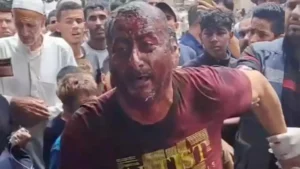Hamas faces growing public dissent as Gaza war erodes support

An injured man in Gaza denounced the Hamas leadership’s actions in a video shared on social media last month
The man in the video is beside himself, a mask of anguish radiating through his bloodied face.
“I am an academic doctor,” he says, “I had a good life, but we have a filthy [Hamas] leadership. They got used to our bloodshed, may God curse them! They are scum!”
The video – unthinkable before the Gaza war – was filmed outside a hospital, inundated with hundreds of Palestinian casualties after an Israeli operation to free hostages from central Gaza last month. Seconds before the video ends, he turns to the crowd. “I’m one of you,” he says, “but you are a cowardly people. We could have avoided this attack!”
The video went viral. And it’s not the only one.
Open criticism of Hamas has been growing in Gaza, both on the streets and online. Some have publicly criticised Hamas for hiding the hostages in apartments near a busy marketplace, or for firing rockets from civilian areas.
Residents have told the BBC that swearing and cursing against the Hamas leadership is now common in the markets, and that some drivers of donkey carts have even nicknamed their animals after the Hamas leader in Gaza – Yahya Sinwar – urging the donkeys forward with shouts of “Yallah, Sinwar!” “People say things like, ‘Hamas has destroyed us’ or even call on God to take their lives,” one man said.
“They ask what the 7 October attacks were for – some say they were a gift to Israel.”
Some are even urging their leaders to agree a ceasefire with Israel.
There are still those in Gaza fiercely loyal to Hamas and after years of repressive control, it’s difficult to know how far the group is losing support, or how far existing opponents feel more able to speak their mind.
But a senior Hamas official privately acknowledged to the BBC, months ago, that they were losing support as a result of the war.
And even some on the group’s own payroll are wavering. One senior Hamas government employee told the BBC that the Hamas attacks were “a crazy, uncalculated leap”. He asked that we concealed his identity.
“I know from my work with the Hamas government that it prepared well for the attack militarily, but it neglected the home front,” he said.
“They did not build any safe shelters for people, they did not reserve enough food, fuel and medical supplies. If my family and I survive this war, I will leave Gaza, the first chance I get.”
There was opposition to Hamas long before the war, though much of it remained hidden for fear of reprisals.
The last time Palestinian elections were held, in 2006, in the party list vote Gazans voted for Hamas in 15 out of 24 seats in the territory – in the other nine districts, voters chose a different party. A year later, Hamas violently ejected Palestinian Authority forces from Gaza causing a bitter rift with the rival Fatah movement, and took over the running of the whole Gaza Strip.
Ameen Abed, a political activist, said he had been arrested many times for speaking out against Hamas before the war, but said – nine months on – dissent was becoming more common there. “In Gaza, most people criticise what Hamas has done,” he said.
“They see children living in tents, and insulting their leaders has become routine. But it has a lot of support among those outside Gaza’s border, who are sitting under air conditioners in their comfortable homes, who have not lost a child, a home, a future, a leg.”
Desperation and war are eroding social structures in Gaza, and Hamas control is not what it was.
